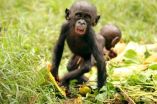(Press-News.org) DURHAM, N.C. -- You're standing in line somewhere and you decide to open a pack of gum. Do you share a piece with the coworker standing to one side of you, or with the stranger on the other?
Most humans would choose the person they know first, if they shared at all.
But bonobos, those notoriously frisky, ardently social great apes of the Congo, prefer to share with a stranger before sharing with an animal they know. In fact, a bonobo will invite a stranger to share a snack while leaving an acquaintance watching helplessly from behind a barrier.
"It seems kind of crazy to us, but bonobos prefer to share with strangers," said Brian Hare, a professor of evolutionary anthropology at Duke University. "They're trying to extend their social network." And they apparently value that more than maintaining the friendships they already have.
To measure this willingness to share, Hare and graduate student Jingzhi Tan ran a series of experiments with bonobos living in the Lola ya Bonobo sanctuary in Kinshasa, Democratic Republic of Congo. The experiments involved piles of food and enclosures that the test subjects were able to unlock and open. Tan and Hare describe their work in a paper in the January 2, 2013 edition of PLOS ONE.
In the first series of experiments, a pile of food was placed in a central enclosure flanked by two enclosures, each of them holding another animal. The test subject had the knowledge and ability to open a door to either of the other chambers, or both. On one side was a bonobo they knew from their group (not necessarily a friend or family member) and in the other was a bonobo they had never really met, but had only seen at a distance.
Upon entering the chamber with the food, the test subjects could easily just sit down and consume it all themselves, or they could let in one or both of the other animals to share.
Nine of the 14 animals who went through this test released the stranger first. Two preferred their groupmates. Three showed no particular preference in repeated trials. The third animal was often let in on the treat as well, but more often it was the stranger, not the test subject, who opened the door for them.
Tan said that by letting the third animal into the enclosure, the stranger voluntarily outnumbered himself or herself with two bonobos who knew each other, which a chimpanzee would never do. In 51 trials of the experiment, there was never any aggression shown, although there was quite a bit of typical bonobo genital rubbing between the strangers.
To isolate how much motivation the animals receive from social interaction, the researchers ran a second set of experiments in which the subject animal wouldn't receive any social contact with another animal. In the first of these experiments, the subjects couldn't get any food for themselves regardless of whether they chose to open the door to allow the other animal to get some food. Nine out of ten animals shared with the stranger at least once.
In the final experiment without social contact, the subject animal was given access to the food in such a way that opening the door to share with the other animal would cost them some food. But they still wouldn't have any social contact as a reward. In this instance, the animals chose not to share. "If they're not going to see a social benefit, they won't share," Hare said.
This second test is similar to something called the dictator game in which humans are given the chance to share cash with a stranger, Hare said. Most people will share anonymously, but they share even more when they aren't anonymous. Bonobos won't share at all in the anonymous condition if it costs them food.
"They care about others," Hare said, but only in a sort of selfish way. "They'll share when it's a low-cost/low-benefit kind of situation. But when it's a no-benefit situation, they won't share. That's different from a human playing the dictator game. You really have to care about others to give anonymously."
The findings, which Hare calls "one of the crazier things we've found" in more than a decade of bonobo research, form yet another distinction between bonobos and chimpanzees, our two closest relatives. "Chimps can't do these tests, they'd be all over each other."
###
The work was funded by the National Science Foundation and the European Research Council.
CITATION - "Bonobos share with strangers." Jingzhi Tan, Brian Hare. PLOS ONE, Jan. 2, 2013.
END
CHAPEL HILL, N.C. – Some brain changes that are found in adults with common gene variants linked to disorders such as Alzheimer's disease, schizophrenia, and autism can also be seen in the brain scans of newborns.
"These results suggest that prenatal brain development may be a very important influence on psychiatric risk later in life," said Rebecca C. Knickmeyer, PhD, lead author of the study and assistant professor of psychiatry in the University of North Carolina School of Medicine. The study was published by the journal Cerebral Cortex on Jan. 3, 2013.
The study ...
Bonobos voluntarily share food and will even forego their own meals for a stranger, but only if the recipient offers them social interaction, according to research published January 2 by Jingzhi Tan and Brian Hare of Duke University.
In a series of experiments, the researchers found that bonobos would voluntarily forego their food and offer it to a stranger in exchange for social interaction. The authors found that the bonobos' behavior was at least partially driven by unselfish motivations, since the animals helped strangers acquire food that was out of reach even when ...
Astronomers using the Atacama Large Millimeter/submillimeter Array (ALMA) telescope have seen a key stage in the birth of giant planets for the first time. Vast streams of gas are flowing across a gap in the disc of material around a young star. These are the first direct observations of such streams, which are expected to be created by giant planets guzzling gas as they grow. The result is published on 2 January 2013 in the journal Nature.
The international team of astronomers studied the young star HD 142527, over 450 light-years from Earth, which is surrounded by a ...
The new study, published today in the journal Nature, examined the probability of keeping average global temperatures from rising more than 2°C above preindustrial levels under varying levels of climate policy stringency, and thus mitigation costs. In addition, the study for the first time quantified and ranked the uncertainties associated with efforts to mitigate climate change, including questions about the climate itself, uncertainties related to future technologies and energy demand, and political uncertainties as to when action will be taken.
The climate system itself ...
VIDEO:
This is Ettore Carretti talking about how the telescope makes maps of the sky.
Click here for more information.
"Monster" outflows of charged particles from the centre of our Galaxy, stretching more than halfway across the sky, have been detected and mapped with CSIRO's 64-m Parkes radio telescope.
Corresponding to the "Fermi Bubbles" found in 2010, the outflows were detected by astronomers from Australia, the USA, Italy and The Netherlands. The finding is reported ...
A study by Johns Hopkins researchers has shown that a widely accepted model of long-term memory formation — that it hinges on a single enzyme in the brain — is flawed. The new study, published in the Jan. 2 issue of Nature, found that mice lacking the enzyme that purportedly builds memory were in fact still able to form long-term memories as well as normal mice could.
"The prevailing theory is that when you learn something, you strengthen connections between your brain cells called synapses," explains Richard Huganir, Ph.D., a professor and director of the Johns Hopkins ...
Astronomers have used the ALMA telescope to get their first glimpse of a fascinating stage of star formation in which planets forming around a young star are helping the star itself continue to grow, resolving a longstanding mystery. The young system, about 450 light-years from Earth, is revealing its complex gravitational dance to the ever-sharpening vision of the Atacama Large Millimeter/submillimeter Array (ALMA), scheduled for completion this year.
As young stars gather material from their surrounding clouds of gas and dust, the incoming material forms a flat, spinning ...
Enormous outflows of charged particles from the centre of our Galaxy, stretching more than halfway across the sky and moving at supersonic speeds, have been detected and mapped with CSIRO's 64-m Parkes radio telescope.
Corresponding to the "Fermi Bubbles" found in 2010, the recent observations of the phenomenon were made by a team of astronomers from Australia, the USA, Italy and The Netherlands, with the findings reported in today's issue of Nature.
"There is an incredible amount of energy in the outflows," said co-author Professor Lister-Staveley-Smith from The University ...
With policymakers and political leaders increasingly unable to combat global climate change, more scientists are considering the use of manual manipulation of the environment to slow warming's damage to the planet.
But a University of Iowa law professor believes the legal ramifications of this kind of geo-engineering need to be thought through in advance and a global governance structure put in place soon to oversee these efforts.
"Geo-engineering is a global concern that will have climate and weather impacts in all countries, and it is virtually inevitable that some ...
Even the best medicines in the world can be rendered ineffective if they are not taken as prescribed. The problem known as medication "non-adherence" is a major health issue in the United States, contributing to worse outcomes for people who have diabetes and other chronic diseases.
Now a study led by researchers at the University of California, San Francisco (UCSF), San Francisco General Hospital and Trauma Center (SFGH) and the Kaiser Permanente Division of Research has identified a significant factor that contributes to poor drug adherence – ineffective communication.
Described ...


